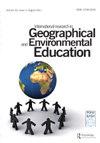Content analysis of the K to 12 Junior High School Geography curriculum in the Philippines
IF 3.1
Q2 EDUCATION & EDUCATIONAL RESEARCH
International Research in Geographical and Environmental Education
Pub Date : 2021-04-19
DOI:10.1080/10382046.2021.1907057
引用次数: 7
Abstract
Abstract This study is a content analysis of the K to 12 Junior High School Geography curriculum of the Department of Education in the Philippines. The First Quarter competencies of Grade 7–10 were categorized and coded to determine the orientation of the curriculum in terms of curricular approaches. Then, themes from evidence of curricular approaches were used to align approaches with sub-disciplines and allied disciplines of geography. Findings show that Grade 7 and 8 have traditional orientation due to the domination of anthropocentric, factual, and determinist approaches into the curriculum. Grade 9 and 10, on the other hand, have contemporary orientation as these are dominated by the issues-based approach. This means that students have low-level thinking skills and have probably developed negative attitudes toward human, physical, and environmental geography in Grade 7 and 8. Students are then ill-prepared to appreciate complex concepts in political ecology when they proceed to Grade 9 and 10. This implies the need to have a stand-alone geography subject in the Junior High School that employs an issues-based approach, which emphasizes concepts and processes in political ecology. This is to provide students with extensive knowledge and critical understanding on the dynamics of human–environment relations.菲律宾K至12年级初中地理课程内容分析
摘要本研究是对菲律宾教育部K-12初中地理课程的内容分析。对7-10年级第一季度的能力进行了分类和编码,以确定课程方法方面的课程方向。然后,利用课程方法证据中的主题,将方法与地理的子学科和相关学科相结合。研究结果表明,由于课程中以人类为中心、事实和决定论的方法占主导地位,七年级和八年级具有传统的取向。另一方面,九年级和十年级则有着当代的取向,因为它们主要是以问题为基础的方法。这意味着学生的思维能力很低,可能在七、八年级时对人文、自然和环境地理产生了负面态度。当学生进入九年级和十年级时,他们对理解政治生态学中的复杂概念准备不足。这意味着需要在初中开设一门独立的地理科目,采用基于问题的方法,强调政治生态学中的概念和过程。这是为了让学生对人与环境关系的动力学有广泛的知识和批判性的理解。
本文章由计算机程序翻译,如有差异,请以英文原文为准。
求助全文
约1分钟内获得全文
求助全文
来源期刊

International Research in Geographical and Environmental Education
EDUCATION & EDUCATIONAL RESEARCH-
CiteScore
5.20
自引率
33.30%
发文量
11
期刊介绍:
International Research in Geographical & Environmental Education publishes quality research studies within the context of geographical and environmental education. The journal endeavours to promote international interest and dissemination of research in the field, provides a forum for critique, and demonstrates the relevance of research studies to good professional practice.
 求助内容:
求助内容: 应助结果提醒方式:
应助结果提醒方式:


